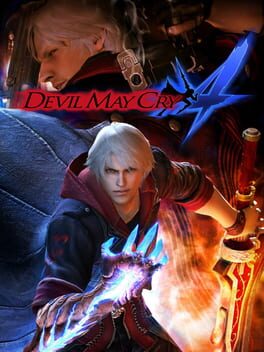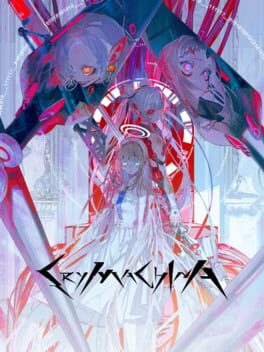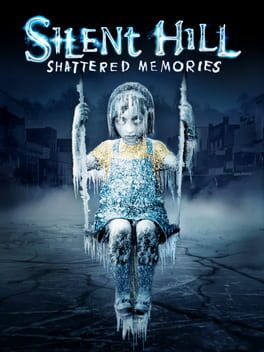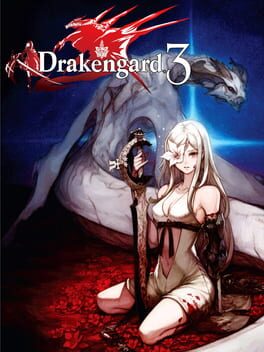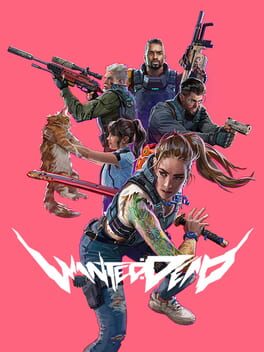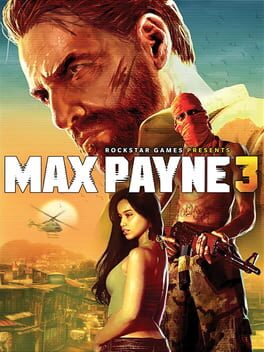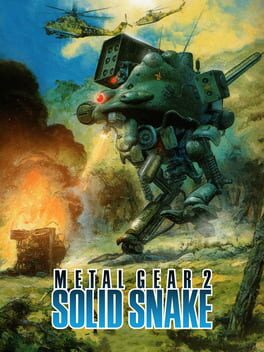49 reviews liked by siddhartino
Devil May Cry 4
2008
DMC feels like the literal definition of the "coolest thing ever" memes where people will critique DMC for being nonsensical or not having combat to their liking... yet it is the coolest thing you'll see.
DMC 4 is a step ahead into a much faster-paced game with heart-pumping combos and satisfying combat that surged adrenaline through my veins. This game is like Monster Energy in playable format. It doesn't take itself seriously, and I love it for that. You're here for a good time, and DMC knows that. I was also impressed at how different Dante and Nero actually play from one another as well, injecting some freshness into the game right when it was beginning to get just a tad tiresome. Fantastic stuff.
Score: 92
DMC 4 is a step ahead into a much faster-paced game with heart-pumping combos and satisfying combat that surged adrenaline through my veins. This game is like Monster Energy in playable format. It doesn't take itself seriously, and I love it for that. You're here for a good time, and DMC knows that. I was also impressed at how different Dante and Nero actually play from one another as well, injecting some freshness into the game right when it was beginning to get just a tad tiresome. Fantastic stuff.
Score: 92
Crymachina
2023
It's not a very well made game in terms of game mechanics and game design, but on "art" side it's wonderful. I absolutely adore it's aesthetics, story concepts, themes, music and characters designs. Even through I don't think the scenario of the story itself and it's structure is very good or entertaining, the characters and themes make it worth a playthrough. You can tell developers and artists put heart and soul into this, despite all the downsides. Voice acting is also delightfully splendid.
Crymachina
2023
Viewed purely as a combat game for the gamer brain, this game is alright. The gameplay is nothing groundbreaking and quite repetitive. But appreciating the game for what it is makes this a really wonderful experience. The combat sections are short and you get to choose when you do them, the actual meat is in the conversations between the main characters that gradually unlock and are also viewable whenever you want them to be. I fell in love with the cast instantly, all of them very written with so much heart and feel so genuine. Because of that, the story also gets to the core of what it wants to tell you instantly. There's no beating around the bush, the characters are true and honest and the themes the game explores feel just as heartfelt.
I also need to add: This game is another entry into the growingly popular genre of sci-fi yuri. If you love that combination, you absolutely have to go for it. It's a must.
I also need to add: This game is another entry into the growingly popular genre of sci-fi yuri. If you love that combination, you absolutely have to go for it. It's a must.
Crymachina
2023
A step in the right direction…. Until you trip
I wasn’t that big of a fan of crystar by the end, while its story, ost and artwork was good everything else about the gameplay fell flat. I was hoping with Crymachina swooping around they would iron out some of the issues and we would finally get a good game from FuRyu. Crymachina is for sure an improvement over Crystar but it still falls flat in some departments really leaving this to be a forgettable experience by the end.
Let's start with the good !
Crymachina in a very similar fashion to Crystar has a good story , amazing artwork and a very good OST. This time around I actually didn’t find myself hating the combat as much. It felt more fluid and landing off combos were fun but I will get more into combat later. Furthermore the characters were good and were flushed out ENOUGH by the end making you care for the main cast as they go through this journey of becoming “real humans”. It’s really interesting though because I pretty much like and dislike the same exact things I did with Crystar as I do with Crymachina. It's just this time around Crymachina improves on some of Crystars bad aspects A LITTLE.
Let's get into the bad
While I did compliment the combat it's still far off from being as good as it should be. The loot pool is better in this title giving you side weapons you can use alongside your main weapon which once again is not changeable. Hell this time around you can’t even equip new main weapons that will change its look you only get number upgrades for your main weapons. The side weapons you collect you activate by pressing L1 and R1 and it will start an automatic use of those weapons. Furthermore you collect skills/ buffs that you can equip to your side weapons that will give you more of an edge in fights. It sounds fun on paper but it quickly feels pointless as the game is extremely easy making you not really think about what you NEED to use. These titles could really use some sort of buff / debuff system because everything just feels so basic in that aspect. In addition, while you collect a good amount of side weapons to use there are only a handful of variants which once again you will not care about what you will use by the end. Furthermore the EXP system is downright weird in this game. To explain , you don’t earn EXP until you finish a mission which sounds normal so far right?. Well EXP isn’t automatically distributed amongst the characters you will simply earn the number and will have to give the EXP to the character you want meaning. What this means is if you dump all your EXP into one character not knowing the next mission you will need to use someone else you just screwed yourself over. Thus starting a boring little grind you will need to do to catch them up to the story level because level scaling is extremely weird in this game. To explain , if you are even 1 level below the recommended level the game wants you to play, the monsters will literally 1 shot you like you are 999 levels below. While the grind isn’t terrible it's just weird and doesn’t add anything to the gameplay loop. Moving on , I was really hoping they would improve on level design but somehow it got worse in this game????. To explain, the backgrounds are extremely boring to look at, the level designs are literally now a straight line. Sometimes you will literally just walk down the aisle to fight the boss with no sub enemies on the way. Furthermore , there are side missions you can do by finding coordinate points that you put into a screen. This sounds cool as you feel like you will have to search hard for these codes but they are simply in the archive section for you to get. On top of these side missions are extremely boring and literally are the same really giving you ZERO reason to do these missions.
While the story is nice the way it's presented is pretty boring at times. You will have the usual cutscene fair but this game throws in a “tea” talk section where you get A LOT of the lore/ character learning from. This becomes an issue quickly as these cutscenes ALL LOOK THE SAME having the characters just sit down and do literally nothing. You will not see them move or anything just sit and you read the bubble text which can go on FOREVER sometimes …. Sounds fun right?. Furthermore, the story, while good, ended abruptly, really not leaving me satisfied at all for these characters and everything they had gone through up to this point. You don’t see ANY of the aftermath for anyone past one short true ending cutscene and it just really leaves you hanging. It’s a shame because I really felt like a rug got pulled out from under me at the end for what was a good story up until that point.
They truly can make an amazing game
If FuRyu has proven anything is that they can truly make/ publish an emotional story mixed with great artwork and awesome characters. I Simply believe if they can just really work in the gameplay field and really flush out their combat , world design and level design we can get a genuinely amazing game from them. I feel as if they need to get better devs for the combat portions of the games seeing as Aquaria worked on this title which they make the SAO titles which are not that great. It’s really a shame because this and Crystar both honestly should have been amazing games but really just fall flat in specific fields by the end.
I 100% do not recommend this game at full price however if you still want to give it a go I do think it would be worth it when it gets a deep sale.
I wasn’t that big of a fan of crystar by the end, while its story, ost and artwork was good everything else about the gameplay fell flat. I was hoping with Crymachina swooping around they would iron out some of the issues and we would finally get a good game from FuRyu. Crymachina is for sure an improvement over Crystar but it still falls flat in some departments really leaving this to be a forgettable experience by the end.
Let's start with the good !
Crymachina in a very similar fashion to Crystar has a good story , amazing artwork and a very good OST. This time around I actually didn’t find myself hating the combat as much. It felt more fluid and landing off combos were fun but I will get more into combat later. Furthermore the characters were good and were flushed out ENOUGH by the end making you care for the main cast as they go through this journey of becoming “real humans”. It’s really interesting though because I pretty much like and dislike the same exact things I did with Crystar as I do with Crymachina. It's just this time around Crymachina improves on some of Crystars bad aspects A LITTLE.
Let's get into the bad
While I did compliment the combat it's still far off from being as good as it should be. The loot pool is better in this title giving you side weapons you can use alongside your main weapon which once again is not changeable. Hell this time around you can’t even equip new main weapons that will change its look you only get number upgrades for your main weapons. The side weapons you collect you activate by pressing L1 and R1 and it will start an automatic use of those weapons. Furthermore you collect skills/ buffs that you can equip to your side weapons that will give you more of an edge in fights. It sounds fun on paper but it quickly feels pointless as the game is extremely easy making you not really think about what you NEED to use. These titles could really use some sort of buff / debuff system because everything just feels so basic in that aspect. In addition, while you collect a good amount of side weapons to use there are only a handful of variants which once again you will not care about what you will use by the end. Furthermore the EXP system is downright weird in this game. To explain , you don’t earn EXP until you finish a mission which sounds normal so far right?. Well EXP isn’t automatically distributed amongst the characters you will simply earn the number and will have to give the EXP to the character you want meaning. What this means is if you dump all your EXP into one character not knowing the next mission you will need to use someone else you just screwed yourself over. Thus starting a boring little grind you will need to do to catch them up to the story level because level scaling is extremely weird in this game. To explain , if you are even 1 level below the recommended level the game wants you to play, the monsters will literally 1 shot you like you are 999 levels below. While the grind isn’t terrible it's just weird and doesn’t add anything to the gameplay loop. Moving on , I was really hoping they would improve on level design but somehow it got worse in this game????. To explain, the backgrounds are extremely boring to look at, the level designs are literally now a straight line. Sometimes you will literally just walk down the aisle to fight the boss with no sub enemies on the way. Furthermore , there are side missions you can do by finding coordinate points that you put into a screen. This sounds cool as you feel like you will have to search hard for these codes but they are simply in the archive section for you to get. On top of these side missions are extremely boring and literally are the same really giving you ZERO reason to do these missions.
While the story is nice the way it's presented is pretty boring at times. You will have the usual cutscene fair but this game throws in a “tea” talk section where you get A LOT of the lore/ character learning from. This becomes an issue quickly as these cutscenes ALL LOOK THE SAME having the characters just sit down and do literally nothing. You will not see them move or anything just sit and you read the bubble text which can go on FOREVER sometimes …. Sounds fun right?. Furthermore, the story, while good, ended abruptly, really not leaving me satisfied at all for these characters and everything they had gone through up to this point. You don’t see ANY of the aftermath for anyone past one short true ending cutscene and it just really leaves you hanging. It’s a shame because I really felt like a rug got pulled out from under me at the end for what was a good story up until that point.
They truly can make an amazing game
If FuRyu has proven anything is that they can truly make/ publish an emotional story mixed with great artwork and awesome characters. I Simply believe if they can just really work in the gameplay field and really flush out their combat , world design and level design we can get a genuinely amazing game from them. I feel as if they need to get better devs for the combat portions of the games seeing as Aquaria worked on this title which they make the SAO titles which are not that great. It’s really a shame because this and Crystar both honestly should have been amazing games but really just fall flat in specific fields by the end.
I 100% do not recommend this game at full price however if you still want to give it a go I do think it would be worth it when it gets a deep sale.
Sometimes you play a game that maybe isn't the best in the series, but it feels like the one that's made for you. That's Shattered Memories for me. A game that delves deep into topics that resonate with me a lot. A game that, after two pretty unoriginal or weak entries, feels like a game that is actually taking advantage of what makes a franchise like Silent Hill so amazing. A game that is just, so fucking beautiful. I get not everyone will like this as much as me, but if you give it a shot, you might see something truly special.
Drakengard 3
2013
If it weren’t for the dreadful performance issues and the prior knowledge of who was at the helm of this project, I would have had a hard time differentiating Drakengard 3 from the countless mid budget Japanese games that populated the 7th gen. It is kinda fitting, and in some ways admirable, that a game coming at the very tail end of the ps3 lifespan, a console notorious for lowering the bar for acceptable framerate and optimization, would achieve the worst performance that ever graced the cell processor. But take away the obvious elephant in the room, and Drakengard 3 is actually a pretty serviceable and enjoyable hack n’ slash that hardly inherits the DNA from its predecessors.
Drakengard 3 carries itself with a whiff of resignation from the outset, an apathetic conformity to the whims of an industry that was slogging on forward to its demise, long after Nier’s final gasp for air. The world didn’t really care for what Drakengard 1 had to say, and while I don’t think Yoko Taro ever expected it to listen, Drakengard 3 is his most indifferent and defeatist work, with a constant self awareness that points out the absurdism of videogames, without ever trying to engage with it for most of the runtime, and while I am certain that the terrible performance issues are just a symptom of rushed development and a nonexistent budget, the 10 FPS drops do lend a certain intentional hilarity to the game at the player’s expense.
Despite not reveling in the misery porn of Drakengard 1, it somehow manages to be an even uglier game, in all senses of the word. The cast gleefully express from the get-go their propensity for violence and murder for comedic effect, the character designs are bloated with generic anime-isms and garish colors that clash with the medieval tone of the environments, the combat is now sufferable and standard musou fare that no longer provides the unique boredom present in Drakengard 1, filling the screen with shallow stylized blood splatter and DMC combos, and the game manages to be unpleasant in wholly new ways thanks to a plethora of explicit and depraved sexual innuendos that decorate most of the script. And yet Yoko Taro manages to find some life in this corpse of a videogame.
In contrast to Drakengard 1, the more you play, the more the game is willing to open a breach and extend its hand to you, regardless of how restrictive its polygon walls can be, and the jaded psychotic nature of its characters manage to somehow open up to reveal a sad, broken world pleading for death and change, of any kind. Even if the only language these characters can speak through are murder and sexual desire, they have the power to change the status quo, no matter how childish and naive that sentiment might be or how badly the cards they have been dealt are. And once again, Drakengard asks that you drop your weapons and everything you learned thus far, devote yourself and your time to its insanity, and struggle through one of the most infuriating and mesmerizing final bosses ever conceived. Bashing your head into a wall to the point of despair and defeat might not seem like the optimal way to communicate such messages, but like one character says after sacrificing itself in a bout of inspiration: “This was more human, wasn’t it?”
Drakengard 3 to me is Yoko Taro’s most impenetrable work, and a big part of it is due to the baffling decision to spread a lot of backstory and lore that drastically changes interpretation of the source material through a bunch of paid DLC, novellas and mangas, context that should have definitely been present in the game itself and would have made this a much more accessible and comprehensible entry in his Drakengard oeuvre. A lot of the ideas from Automata seem to have been conceptualized here first, such as being trapped in an endless death and rebirth cycle of bloodshed, a near impossible final boss that has you fighting against the game itself, or a meta-textual force interfering with the outcome of the story, and it functions like an inevitable bridge between Nier’s sorrowful epipath and Nier Automata’s existential rebellion. Drakengard 3 is the perfect 7th gen game, both a symptom of and a response to the dark age of japanese videogames. It just embodies that ethos a bit too much for its own good sometimes.
And yeah, this review was just an excuse to say I beat the Final Song. I did it. It took me 5+ hours to do it, but I fucking did it, and I did it without syncing the game to no video guide either. Hitting that final invisible note by pure intuition after going through hell is the most beautiful thing ever in videogames, and I’m so glad I never have to go through it again.
Drakengard 3 carries itself with a whiff of resignation from the outset, an apathetic conformity to the whims of an industry that was slogging on forward to its demise, long after Nier’s final gasp for air. The world didn’t really care for what Drakengard 1 had to say, and while I don’t think Yoko Taro ever expected it to listen, Drakengard 3 is his most indifferent and defeatist work, with a constant self awareness that points out the absurdism of videogames, without ever trying to engage with it for most of the runtime, and while I am certain that the terrible performance issues are just a symptom of rushed development and a nonexistent budget, the 10 FPS drops do lend a certain intentional hilarity to the game at the player’s expense.
Despite not reveling in the misery porn of Drakengard 1, it somehow manages to be an even uglier game, in all senses of the word. The cast gleefully express from the get-go their propensity for violence and murder for comedic effect, the character designs are bloated with generic anime-isms and garish colors that clash with the medieval tone of the environments, the combat is now sufferable and standard musou fare that no longer provides the unique boredom present in Drakengard 1, filling the screen with shallow stylized blood splatter and DMC combos, and the game manages to be unpleasant in wholly new ways thanks to a plethora of explicit and depraved sexual innuendos that decorate most of the script. And yet Yoko Taro manages to find some life in this corpse of a videogame.
In contrast to Drakengard 1, the more you play, the more the game is willing to open a breach and extend its hand to you, regardless of how restrictive its polygon walls can be, and the jaded psychotic nature of its characters manage to somehow open up to reveal a sad, broken world pleading for death and change, of any kind. Even if the only language these characters can speak through are murder and sexual desire, they have the power to change the status quo, no matter how childish and naive that sentiment might be or how badly the cards they have been dealt are. And once again, Drakengard asks that you drop your weapons and everything you learned thus far, devote yourself and your time to its insanity, and struggle through one of the most infuriating and mesmerizing final bosses ever conceived. Bashing your head into a wall to the point of despair and defeat might not seem like the optimal way to communicate such messages, but like one character says after sacrificing itself in a bout of inspiration: “This was more human, wasn’t it?”
Drakengard 3 to me is Yoko Taro’s most impenetrable work, and a big part of it is due to the baffling decision to spread a lot of backstory and lore that drastically changes interpretation of the source material through a bunch of paid DLC, novellas and mangas, context that should have definitely been present in the game itself and would have made this a much more accessible and comprehensible entry in his Drakengard oeuvre. A lot of the ideas from Automata seem to have been conceptualized here first, such as being trapped in an endless death and rebirth cycle of bloodshed, a near impossible final boss that has you fighting against the game itself, or a meta-textual force interfering with the outcome of the story, and it functions like an inevitable bridge between Nier’s sorrowful epipath and Nier Automata’s existential rebellion. Drakengard 3 is the perfect 7th gen game, both a symptom of and a response to the dark age of japanese videogames. It just embodies that ethos a bit too much for its own good sometimes.
And yeah, this review was just an excuse to say I beat the Final Song. I did it. It took me 5+ hours to do it, but I fucking did it, and I did it without syncing the game to no video guide either. Hitting that final invisible note by pure intuition after going through hell is the most beautiful thing ever in videogames, and I’m so glad I never have to go through it again.
Wanted: Dead
2023
Poco ironicamente è la nouvelle vague videoludica, un rovesciamento completo di tantissimi stili videoludici mischiati da loro. Una scrittura alla kojima che incontra souls che incontra i musou e 2000 altre reference, pure memetiche, è a tutti gli effetti una rottura completa con qualsiasi standard. La considero una delle robe più punk di sti anni, ma allora dov'è il problema? Ik mezzo a scene anime completamente randomiche su cui costruire qualcosa è impossibile, si può notare che seppure il tentativo cosciente di rovesciamento c'è manca un obiettivo. Non si va a dire qualcosa di estremamente politico pur essendo un gioco pro honk kong e anticapitalista, non si va a creare una complessità reale nel set di combo ma ti fa comunque godere fon sta spilungona di 2 metri completamente bagnata di sangue dalla testa ai piedi. Poi ci sono minigiochi random, costruiti per perculare qualcosa che era già una perculata a suo modo (tipo yakuza). Infine boh veramente i dialoghi passano da schizofrenia totale a battute da seconda media a riflessioni sull'impossibilità di vivere in un contesto politico su cui non hai agency. Curioso di vedere che altro faranno le persone coinvolte 👍
P.S: ma poi lmao se ne sono occupati quelli che hanno fatto il gioco di samurai jack e naruto to boruto shinobi striker, qualcuno dia una qualche direzione a sta gente non è possibile sto approccio completamente schizo e competente allo stesso tempo.
P.P.S: un gioco che comunque non è difficile nonostante quello che si dica, lo è solo l'inizio in cui non hai combo e perché pensi che sia uno shooter. L'ho giocato pensando spesso a metal gear rising, quindi subito sapevo di dover colpire con spada e fare la combo
P.S: ma poi lmao se ne sono occupati quelli che hanno fatto il gioco di samurai jack e naruto to boruto shinobi striker, qualcuno dia una qualche direzione a sta gente non è possibile sto approccio completamente schizo e competente allo stesso tempo.
P.P.S: un gioco che comunque non è difficile nonostante quello che si dica, lo è solo l'inizio in cui non hai combo e perché pensi che sia uno shooter. L'ho giocato pensando spesso a metal gear rising, quindi subito sapevo di dover colpire con spada e fare la combo
Max Payne 3
2012
And the duology is complete.
Definitely a big step up from the original Metal Gear. The story feels much more like the type of story Kojima would become known for, it's a lot more twisty and spy film inspired than its predecessor. Also really neat to see the introduction of a few characters in MGS, especially fulfilling to see Gray Fox's debut. The soundtrack is also pretty great, the original game had a few decent tracks but this one has some genuinely memorable themes (the first building's main theme especially). There's also a pretty big difficulty jump in this game, guards have excellent sight and peripheral vision, so you need to play extra careful to avoid getting spotted. It's still obviously a product of its time and a few mechanics are dated (albeit the checkpoints are more generous than the first game), but it's still a genuinely good game that is worth playing for longtime fans who haven't played the originals like myself before last night.
7/10
Definitely a big step up from the original Metal Gear. The story feels much more like the type of story Kojima would become known for, it's a lot more twisty and spy film inspired than its predecessor. Also really neat to see the introduction of a few characters in MGS, especially fulfilling to see Gray Fox's debut. The soundtrack is also pretty great, the original game had a few decent tracks but this one has some genuinely memorable themes (the first building's main theme especially). There's also a pretty big difficulty jump in this game, guards have excellent sight and peripheral vision, so you need to play extra careful to avoid getting spotted. It's still obviously a product of its time and a few mechanics are dated (albeit the checkpoints are more generous than the first game), but it's still a genuinely good game that is worth playing for longtime fans who haven't played the originals like myself before last night.
7/10
Played on the PlayStation Vita via the Metal Gear Solid 3: Snake Eater HD Edition, which features some very minor translation and artwork differences from the original MSX2 release.
It kind of blows my mind that this is almost universally considered to be a massive improvement on Hideo Kojima's first foray into the stealth-action genre. Don't get me wrong, it is a marginally better experience thanks to things like a wider variety of interesting one-off set pieces and scenarios, as well as the option to combine some of your key cards at certain points so that you aren't having to dig through 8+ of them every time you encounter a new door. Yet, it still suffers from the exact same annoying design choices that make the preceding Metal Gear something of a pain to revisit. Namely, a frustrating lack of direction and constant backtracking (the amount of times I had to leave and return to the bloody Zanzibar Building...).
If anything these problems are only exacerbated by the increased scale of the adventure. Solid Snake features a far larger quantity of locations, military compounds (often with multiple floors), and environments to visit, and you're expected to remember every nook and cranny of their typically sprawling layouts in order to go back to the areas you haven't accessed yet whenever you find a new tool just to see if it will open them or not. With next to no guidance in regards to where the following objective or piece of the puzzle is located outside of the occasional and usually not entirely helpful hints from NPCs, you're forced to resort to either harassing each codex contact at your disposal or, at the game's very worst, random experimentation to make any sort of progress. The latter being a process made all the more irritating due to not being able to easily restock your inventory as consumable pick-ups no longer immediately respawn after you leave a room and checkpoint placements continuing to not be ideal.
Now, I don't need my hand held throughout the entire adventure. There are plenty of titles like Hohokum or The Binding of Isaac that I've enjoyed which throw you into their worlds with next to no instruction at all and require you to figure everything out on your own. The difference is the vagueness in those games is used to bolster a sense of player-driven exploration and discovery through the freedom such an approach lends to their design, whereas here because there is a set series of destinations and tasks you must complete in a specific order the fact that it's so cryptic is simply a means of artificially extending what would otherwise be a pretty short runtime. A trait not uncommon in the industry during that era. As a result, this second official entry in the franchise gets off to one of the most aggressively enraging starts I have personally ever encountered in a video game as you fumble around under-equipped and with no clue where to go in a four-story building full of paths and side rooms that never serve a purpose. The aimlessness is irritating to say the least.
Once you finally begin to get a handle on things however, you'll find there's actually quite a bit to be impressed with. The stealth gameplay itself for example has been massively improved, with enemies now able to react to sounds other than just simple gunfire and sporting a wider range of vision that allows them to see the whole area in front of themselves rather than merely in a straight line directly ahead, ON TOP of player's having been given the ability to now crawl under objects which adds another method to avoid getting spotted. This is also where Kojima first introduced the elaborate, deep storytelling and the kind of big water-cooler moments you can talk with your friends about that would later define the property. Obviously neither reach the heights of the Solid installments due to lacking the same cinematic presentation, but they do give this sequel some merit.
Overall, I think this entry just further goes to show exactly how much Ghost Babel on GBC refined and even perfected this style of Metal Gear. Largely by moving away from the more open-ended format of interconnected screens and adopting a relatively closed-off, level based structure. So if you're interested in seeing what the franchise's roots are like, that would be the way I suggest going about it. Like its predecessor, Solid Snake is worth checking out for the history lesson if you're a hardcore fan, but if all you're truly looking for is a fun time I can't recommend it.
6.5/10
It kind of blows my mind that this is almost universally considered to be a massive improvement on Hideo Kojima's first foray into the stealth-action genre. Don't get me wrong, it is a marginally better experience thanks to things like a wider variety of interesting one-off set pieces and scenarios, as well as the option to combine some of your key cards at certain points so that you aren't having to dig through 8+ of them every time you encounter a new door. Yet, it still suffers from the exact same annoying design choices that make the preceding Metal Gear something of a pain to revisit. Namely, a frustrating lack of direction and constant backtracking (the amount of times I had to leave and return to the bloody Zanzibar Building...).
If anything these problems are only exacerbated by the increased scale of the adventure. Solid Snake features a far larger quantity of locations, military compounds (often with multiple floors), and environments to visit, and you're expected to remember every nook and cranny of their typically sprawling layouts in order to go back to the areas you haven't accessed yet whenever you find a new tool just to see if it will open them or not. With next to no guidance in regards to where the following objective or piece of the puzzle is located outside of the occasional and usually not entirely helpful hints from NPCs, you're forced to resort to either harassing each codex contact at your disposal or, at the game's very worst, random experimentation to make any sort of progress. The latter being a process made all the more irritating due to not being able to easily restock your inventory as consumable pick-ups no longer immediately respawn after you leave a room and checkpoint placements continuing to not be ideal.
Now, I don't need my hand held throughout the entire adventure. There are plenty of titles like Hohokum or The Binding of Isaac that I've enjoyed which throw you into their worlds with next to no instruction at all and require you to figure everything out on your own. The difference is the vagueness in those games is used to bolster a sense of player-driven exploration and discovery through the freedom such an approach lends to their design, whereas here because there is a set series of destinations and tasks you must complete in a specific order the fact that it's so cryptic is simply a means of artificially extending what would otherwise be a pretty short runtime. A trait not uncommon in the industry during that era. As a result, this second official entry in the franchise gets off to one of the most aggressively enraging starts I have personally ever encountered in a video game as you fumble around under-equipped and with no clue where to go in a four-story building full of paths and side rooms that never serve a purpose. The aimlessness is irritating to say the least.
Once you finally begin to get a handle on things however, you'll find there's actually quite a bit to be impressed with. The stealth gameplay itself for example has been massively improved, with enemies now able to react to sounds other than just simple gunfire and sporting a wider range of vision that allows them to see the whole area in front of themselves rather than merely in a straight line directly ahead, ON TOP of player's having been given the ability to now crawl under objects which adds another method to avoid getting spotted. This is also where Kojima first introduced the elaborate, deep storytelling and the kind of big water-cooler moments you can talk with your friends about that would later define the property. Obviously neither reach the heights of the Solid installments due to lacking the same cinematic presentation, but they do give this sequel some merit.
Overall, I think this entry just further goes to show exactly how much Ghost Babel on GBC refined and even perfected this style of Metal Gear. Largely by moving away from the more open-ended format of interconnected screens and adopting a relatively closed-off, level based structure. So if you're interested in seeing what the franchise's roots are like, that would be the way I suggest going about it. Like its predecessor, Solid Snake is worth checking out for the history lesson if you're a hardcore fan, but if all you're truly looking for is a fun time I can't recommend it.
6.5/10
